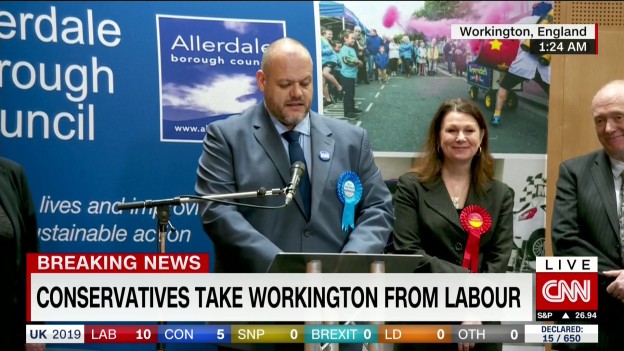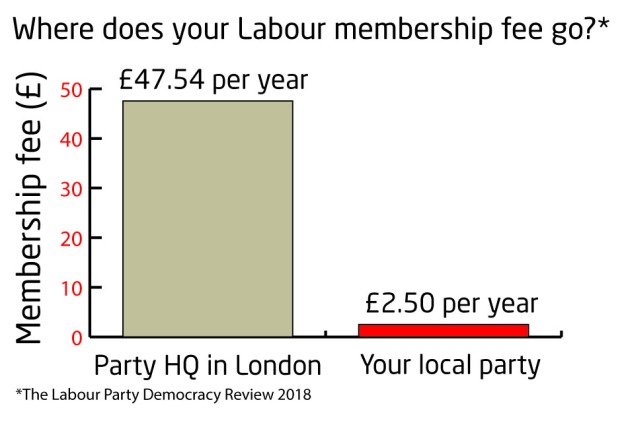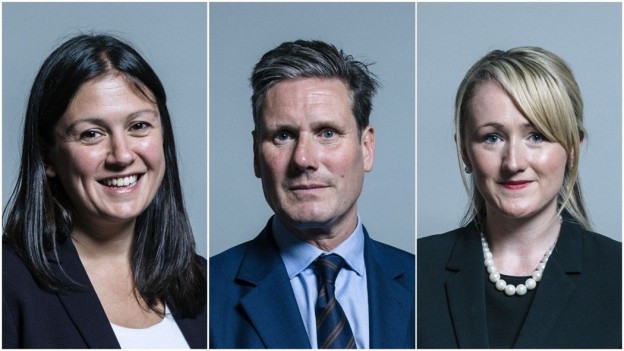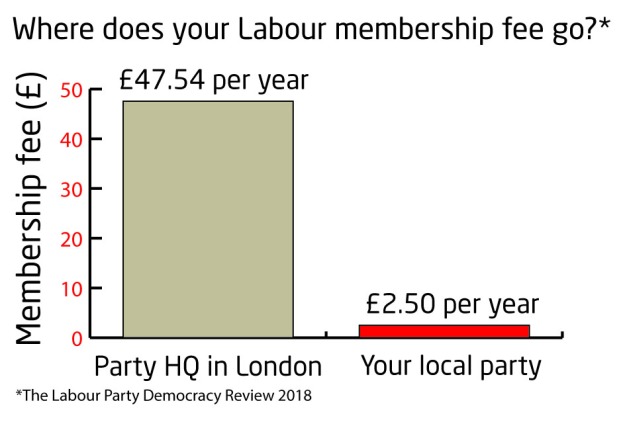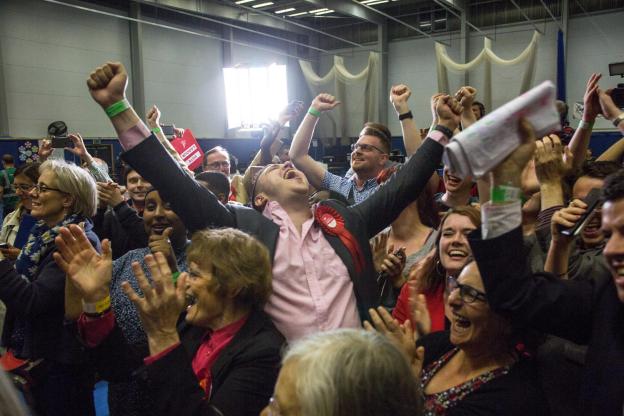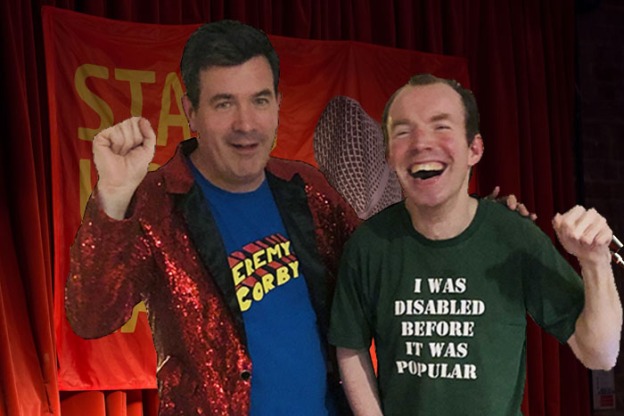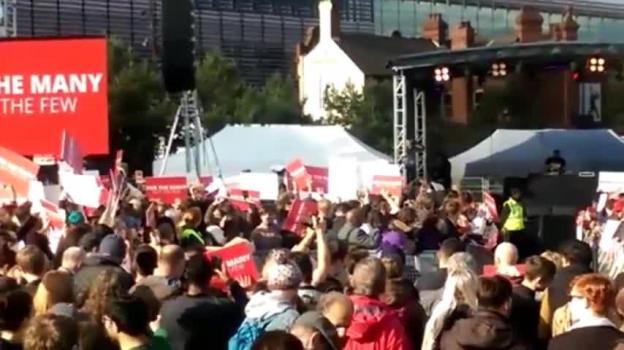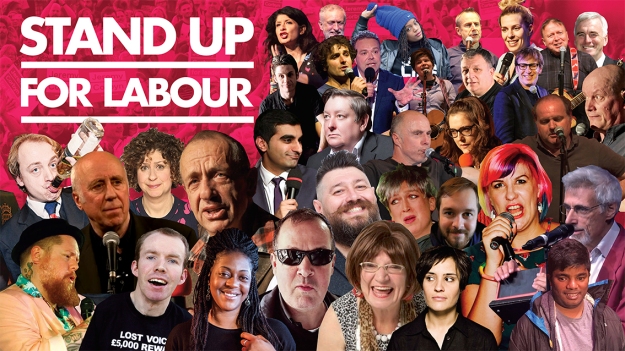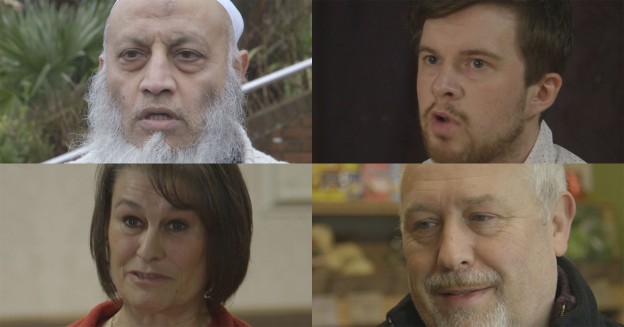In the past few weeks I have noticed a lot of negativity about the Labour Party in the media. And it was depressing to read.
It almost made me forget how good the party is.
To counter this deluge of propaganda against an institution that has brought so much good to the country and has also given me hope for the future, I decided that I was going to write a tribute to a member every day on Facebook.
If you want to keep up with this, click here and ‘like’ the page.
These are my first ten tributes to Labour Party heroes.
Labour Party hero #1

TONY LOUKI
After my first Labour Party meeting in 2011 – held in a Portokabin in Brentford Girls’ school – Tony came up to me and made me feel welcome in the party. He explained what some of the acronyms meant and what some of the party positions were about. He gave me a good steer.
I bumped into Tony fairly regularly after that. We’d talk on the train from Syon Lane to Waterloo about local politics as well as football. Tony supports QPR but he never made my support for Fulham an issue!
Tony encouraged me to stand for positions and was a great support to me when I started doing comedy nights for my CLP. He was good at selling tickets to friends and family.
Tony stood as a council candidate in 2014 – as I did. His ward (Osterley and Spring Grove) was regarded as a more likely Labour gain than mine (Chiswick Homefields) so I helped to get the vote out for Tony on the evening of the vote.
Tony put a lot of work into winning his council seat and it paid off as he was the only Labour candidate to win in his ward.
Since then he has put in an equally hard amount of work into being a councillor. Not only does he report any litter and potholes, but he questions planning decisions despite this not sitting well with his Labour colleagues in senior positions on the council. He also holds regular meetings with residents – beyond surgeries.
Tony’s majority increased in May’s council election.
If all Labour representatives worked as hard as Tony then there is no doubt in my mind that the party would be governing locally and nationally for decades and decades.
Labour Party hero #2
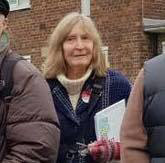
JUDY ATKINSON
Judy Atkinson was Secretary of my CLP when I first attended meetings. I’ve met few people who are as familiar with the Labour Party rulebook and have fought as much for a democratic, inclusive party.
When I attended my first meetings in Chiswick (part of Brentford & Isleworth), I found that the ‘business’ part took up a lot of time. Heated arguments were conducted about how we debate an amendment – or whether it should be debated at all. And my perception was that some people looked rather smug about their ability to conduct themselves in meetings.
I wondered if politics was about procedural arguments and not fighting for social justice.
It almost seemed as though there was an attempt to make meetings tedious. And people holding positions in the party often didn’t turn up or would sit in a position for a year and do very little – and no one would make any complaint.
Judy Atkinson knew that my local party wasn’t doing much to encourage members to participate and saw that I was keen to do stuff.
She helped to put me into a position as vice-chair Membership as she saw that no one else was interested. This allowed me to think of ways to engage more people in the party and in politics. And she helped me to get permission to put out a membership survey, bespoke leaflets to every ward and a comedy show that led to the start of Stand up for Labour.
Judy has a fiesty side to her that enables her to put forward ideas without fear of confrontation. This makes her unpopular with some members who have labelled her a troublemaker. But my experience of politics is that if you are not prepared to put yourself on the line then nothing will be achieved.
Judy is heroic because she won’t compromise on the principle that we must do more to make the party democractic and engaged with our community.
I have seen her voted out as Secretary in an organised move conducted behind her back. But she stood again and didn’t give up.
It is this spirit that inspires me to keep going whatever happens.
Labour Party hero #3

PAUL GOGGIN
In 2003, Paul Goggin found himself homeless in Bristol. As someone who had only been diagnosed as bipolar a couple of years earlier, it must have been very tough.
However, Paul made friends in emergency accommodation. He met asylum seekers, lots of people with mental health issues worse than him, young families, immigrants and political dissidents.
Paul was able to see that he wasn’t alone and that his life experiences (such as living with a parent with gambling addiction and an attendant fear of the bailiffs coming around) were not unique.
This sense of perspective and solidarity saw Paul through and he eventually got a council bungalow 18 months later.
Paul never forgot the people who had helped him.
With the Tories talking about cuts to public spending, he joined the Labour Party in 2010 and started to attend meetings and go to party socials like Stand up for Labour.
It was at a couple of Stand up for Labour shows and a #JC4PM extravaganza that I got to know Paul. He is one of the most helpful people I have met and has offered to lift heavy equipment as well as playing music between performers when my hands are full.
The most heartening thing about this whole story is that Paul stood to be a councillor in Bristol and got elected in 2016.
And he has already made a massive difference to the lives of people in Bristol.
Only this week it was announced that Bristol council will no longer be using bailiffs. This came about because Paul explored an ethical debt collection scheme being used by Hammersmith & Fulham council. Paul was able to persuade Bristol council to follow its example.
At a recent council meeting, Paul opened up about his experience as a mental health service user in a motion calling for more funding from central government. This is what he said:
“The lack of funding means that children are unlikely to get help unless they seriously self harm or attempt suicide. 6,000 people a year do not get the help they need and go on to end their lives. What a waste. People, often from the most deprived backgrounds, thrown on the scrapheap or worse.
“I’ve seen how mental health provision has been cut and cut again, mental health professionals stripped from GP surgeries. I have seen it first hand in my own journey as a service user.
“I live with bipolar disorder and chronic anxiety – without help I could’ve been the six thousand and first person, but I was lucky.”
The Labour Party – and all of us – are blessed to have Paul Goggin.
Labour Party hero #4
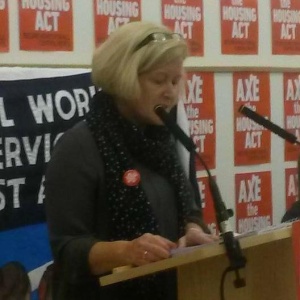
JANICE SWEENEY
Janice beat me in a council candidate selection vote last December – and I’m pleased she won.
I first met Janice last year when we both got involved in a campaign to save the Wornington College.
She’s a real people person – a great listener and someone who encourages people to get involved rather than imposing herself on a campaign.
Janice has also been involved in the campaign to save the local library, to save the Silchester Estate (which is next to Grenfell Tower), and has been one of many calling for Justice for Grenfell.
Janice has lived around North Kensington for decades and loves her community.
Her political journey started when she read about the Tory Housing Bill that threatened to move her away from the area.
Under the legislation, Janice and her husband would be required to pay full market rent for their council house as they were collectively earning over £30,000.
Janice went to her local councillor surgery to find out what she could do. She was told a group had formed called Axe the Housing Act so she started going to their meetings.
The more she heard about the housing act the more terrified she was and she knew more people had to get on board to fight it. She went on demonstrations, met Lords in parliament and did weekly stalls getting the word out that our council homes were at risk. Luckily most of the legislation hasn’t appeared even though it’s been passed.
The campaign showed her that if you kick up enough fuss, things can change for the better.
Janice has brought this energy into other campaigns, and she identifies Jeremy Corbyn as an ally.
‘He always turned up at the demonstrations and didn’t sound like other politicians, he was so sincere.’
She joined the Labour Party because she wanted to vote for Jeremy Corbyn when he was being challenged by Owen Smith. She went up to parliament to show support for him at a mass impromptu rally. He gave her hope for the first time – and she was going to put up a fight to keep him!
Janice started attending Labour Party meetings and, when the council elections loomed, someone suggested she stand as a candidate. She knew she had to stand if she wanted real change and rid Kensington & Chelsea of the Tories.
I was pleased that she won the vote to be selected for Norland Ward. Janice is so popular locally that many people from local campaigns helped her out with leafleting and canvassing. Although she didn’t win the seat, Labour’s vote increased significantly and she undoubtedly gave the Tories a fright.
Determined members like Janice Sweeney are just what the Labour Party needs.
Labour Party hero #5
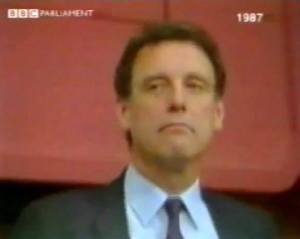
IAN FLINTOFF
Ian Flintoff (from now on I’ll just call him my dad because it’s weird otherwise) was born before the war and brought up in Preston in Lancashire.
His dad, Tom, was a councillor for the Conservative Party and he and my grandmother, Alice, were proud to support Winston Churchill’s son when he was MP for Preston.
My grandad was from the backstreets of Preston, where most people worked on the cotton mills. He aspired for more for his children and, after training at night school, started in clerical work.
My dad and his older brother, Ted, both adopted this ethos of hard work and managed to pass the 11-plus and make it to Grammar School. After National Service they both went to Oxford University.
As far as I know my dad was a bit of a Tory when he was in his teens and early 20s. And he was now at Oxford and I’m sure that his social circle was far from Socialist.
After University, my dad became an actor (working with Spike Milligan in a play in the West End, appearing on TV shows like ‘Z Cars’ and even featuring in a James Bond film). As far as I know he was still a Tory at this stage.
Then, in the late 1960s, my dad took a job as a newsreader for Southern Television. And, once when he was preparing for a news bulletin, he listened in to an interview being broadcast that night with Anthony Wedgwood Benn (as he was called at the time).
My dad says that what he heard from Tony Benn that night persuaded him to join the Labour Party and he resolved to help them in their campaigns.
Soon after, my dad left Southern Television and started work for the Labour Party in their headquarters at Transport House. He was part of Harold Wilson’s General Election team in 1970 and became a council candidate for Labour in Kensington & Chelsea in 1971 (he only served one term).
After a decade or so of working at the Common Market, acting in repertory theatres and doing some TV work, my dad seemed to get political again before the 1979 General Election, when I remember lots of leaflets being delivered in the pelting rain one day.
He set up ‘Arts for Labour’, in which actors and performers were encouraged to show support for the party. People like Bill Owen from ‘Last of the Summer Wine’, Ken Loach and Tony Robinson from ‘Blackadder’ got involved. It was in many ways a precursor to Red Wedge.
I remember the Deputy Leadership Election between Tony Benn and Denis Healey and how disappointed my dad was that Tony Benn lost. But the thing that really wound him up was the foundation of the SDP – dividing the non-Tory vote and letting in Thatcher.
My dad was so angry with the SDP that he decided to try to stand as Labour’s candidate against SDP leader David Owen in 1987. Not being from Plymouth didn’t seem to hold him back and somehow he got selected.
I was very proud to see ‘Vote Flintoff’ posters all over the place when we went canvassing with him. And on one hustings he outclassed David Owen by speaking without notes while Owen stumbled through a typed out speech. Although my dad didn’t win, Labour’s vote increased by 5,000 and the tide had turned enough against Owen that he had to take a peerage to avoid defeat in the next election.
My dad has always been a proud Socialist and a Pacifist. I wore a CND badge when I was at Primary School and both my parents have been active Quakers. I’ve always believed that there is no justification for taking human life and we marched together against the Iraq War in 2001.
Although he’s not stood to be a candidate since 1987, my dad still attends meetings and has built up his branch in Oxford by putting on great social events.
He is always optimistic about the Labour Party. He was not a fan of Tony Blair but he stayed in the party throughout and was overjoyed when Jeremy Corbyn was elected leader. He often writes letters to the papers in support of JC.
He encourages me to keep going, to do more to make politics engaging.
Tony Benn inspired him and he inspired me.
Labour Party hero #6

HENRY LAND
In 2015, Henry Land was a primary school teacher in Dorset, struggling to manage his heavy workload and acutely aware of a lack of resources for him and his colleagues.
His frustration with work is felt by most in the teaching profession but, for many, it is regarded as par for the course.
Henry’s sense that there might be an alternative was awakened by Jeremy Corbyn’s Labour leadership campaigns and his economic policy that puts people before profits.
Henry joined the Labour Party in 2016 and was soon attending CLP meetings in his constituency of Bournemouth West.
Henry became a man with a mission – to turn traditionally ‘blue rinse’ Bournemouth red.
He was tasked with fundraising and emailed me about putting on a Stand up for Labour show in the centre of Bournemouth.
He wanted to put on the biggest fundraiser that Bournemouth had seen and wanted to get the best names and sponsorship from trade unions and a collaboration with the local student society.
He phoned me up to discuss his idea further. He was buzzing with enthusiasm and excited about getting more members to turn out so they could build towards taking one or both Bournemouth seats from the Tories.
I’m not sure if Bournemouth seats are key marginals but Henry persuaded me that they are.
We arranged a great show at the Old Fire Station, with Arthur Smith, Attila the Stockbroker, Theresa May Cabaret and two great local singers that Henry knows.
The night was as buzzing as the energy that Henry put into it. There were over 200 people. People loved the music, the poetry, the comedy and the nonsense. And it raised over £2,000.
Henry built up a great team on that night. The venue was paid for by Unicorn Training (run by a local member) and the performers’ fees were covered by local trade unions (Unison, Unite, RMT and the CWU). He also organised a stall for the Student Society. The stage had five banners!
Since that night Henry has not let up.
He is forever popping up on my timeline with Live Facebook videos about his canvassing experiences and he was part of a large contingent from Bournemouth attending the big demonstration against austerity in London.
Henry’s energy is infectious and older members of the party have given him the tools that have enabled him to frighten formerly complacent local Tories.
Jeremy Corbyn’s leadership has inspired people all over the country to believe that frustrating, arduous work is not an inevitability. Henry is a great example of someone who is fighting back.
Labour Party hero #7

KEITH BURSTEIN
Keith was born into music. Both his parents were professional violinists and played at The Royal Opera House, Sadlers Wells and The Halle.
Politically, his parents were both left-leaning. Keith followed their path in music but didn’t get involved in politics for many years.
Keith’s latent political side came to the fore after 9/11, when he got involved with Stop the War.
As a graduate of the Royal College of Music and an accomplished composer, Keith wanted to combat the warmongering rhetoric of many politicians and the media.
He evolved a plan to write an opera on the issue.
That this was controversial is an understatement.
Keith wrote ‘Manifest Destiny’ in 2003 with Welsh playwright Dic Edwards and the Edinburgh Production was on just after the 7/7 bombings.
The opera portrays would-be suicide bombers renouncing violence – under the influence of the teachings of Islam – and becoming peace makers.
An article appeared in the ‘Evening Standard’ saying that through the opera he glorified terrorism- a serious criminal offence.
Keith sued Associated Newspapers for libel. Jeremy Corbyn stepped in to help and organised a news conference for him in Parliament in 2007.
Keith won in the High Court but lost at Appeal and he was bankrupted by Associated Newspapers, who also tried to take the intellectual property rights of everything he had written, including the opera ‘Manifest Destiny’.
I met Keith after Jeremy Corbyn was elected Labour leader in 2015. He joined the party at that time and, while I was working on the #JC4PM tour, he was working on an opera, ‘The Prometheus Revolution’, in which all the accumulated trends and pressures since 9/11 come to a head and a peace movement emerges.
Despite his experience of losing such a long court case and going bankrupt, Keith sees the good in people and is optimistic about the future.
The combination of his creative approach to political expression, his bravery to take on the establishment and his cheerful outlook after such a painful experience, makes him a 24- carat hero.
And there is a happy ending to this tribute.
Keith’s opera, ‘The Prometheus Revolution’, is being premiered this coming week at the Arcola Theatre in London from the 7th to 10th August.
Labour Party hero #8

MANDY McKENNA
I met Mandy in May at a Stand up for Labour show in a community centre in North Walsham, a market town in North Norfolk.
She gave me a whole new perspective on life in rural England.
Mandy had put a lot of work into making the night a success, with over 120 people in attendance being entertained by a mind reader, a local poet and Norman Lovett.
After the show, Norman and I met up with Mandy and her husband, the portrait painter, Terence McKenna. We stayed the night at their cottage at the end of the longest unmade track I have ever bumped along.
Once there, we broke freshly made bread and chewed over politics.
Mandy enlightened me about life in Norfolk: she told me about the foodbank she volunteers at and how much local people were struggling with austerity.
She told me her story.
She’d been political all her life. She marched to Aldermaston against the bomb with Kensington and Chelsea Youth CND (where she was brought up) and attending many rallies against the Vietnam war.
She moved out of London to start a family in Norfolk in the early 1970s but this didn’t subdue her political edge.
She joined the early non-violent direct action Snowball Peace campaign in Norfolk speaking from a soapbox in Fakenham and cutting a single strand of the fence as a symbol of protest against US nuclear weapons at military base at Sculthorpe.
She was active in supporting the Miners in 1984/5, going to Sheffield and Wales with a play written by Ditton and Ford about Miner’s wives. She also played in a political anti-fascist ska punk band, The Vital Disorders, who did many benefit gigs at Norwich Labour Club for the miners.
In the 1990s, Mandy taught and ran a youth theatre at a local 6th Form College. She was able to teach Brecht, Dürrenmatt and direct many plays with political and social content. She became a Forum theatre practitioner using the techniques of Augusto Boal, the Brazilian activist, and used these techniques to examine moments of oppression from all angles. She went into schools with programmes on bullying and LGBT issues.
Mandy joined the protest against the Iraq War in 2003 and later joined the Green Party for a short while. But she resigned and joined the Labour Party as soon as Jeremy Corbyn was elected leader.
Corbyn was familiar to Mandy from the peace movement and she was able to commit to the Labour Party as a party that would be a force for peace, would tackle the problems of climate change, develop renewable energy, support the disabled and care for both Education and our NHS.
Her enthusiasm for the Labour Party was further fired up by her experience of being a delegate at the party conference.
Every week Mandy is part of a team leafletting in North Walsham, where they campaign to stop children’s services being cut or to stop the fire service being incorporated into the police service.
As Womens Officer for North Norfolk CLP, she arranges lifts and informal sessions for women who have trouble getting to meetings. The local party collect for the Period Poverty Campaign and donate sanitary products to the local foodbank.
The Labour Party could be a real force in rural England with members like Mandy leading the way.
Labour Party hero #9

JIM MATHESON
Jim Matheson is a Labour Party activist in Cathcart CLP in Glasgow who has incredible energy and commitment to a Jeremy Corbyn-led Labour Party.
I got to know Jim when I was looking for support from local activists for a #JC4PM show in Edinburgh in March 2016.
The Tour Manager has booked one of the largest venues in Scotland and, although the line up included Charlotte Church, Mark Steel and Jeremy Hardy, ticket sales were very slow.
I felt personally responsible for any bad publicity for Jeremy Corbyn that a low turnout would provide so I was trying every imaginable way to drive ticket sales.
My hands were tied in some ways by a few political issues relating to the show. Francesca Martinez had booked Janey Godley to perform and Janey was known for supporting the SNP (but liking Corbyn at the same time). The media picked up on this and this made Labour MSPs – and Scottish Labour – decidedly hostile to the show.
Support for the show from Labour in Scotland was very thin on the ground.
But then Jim Matheson came on the scene.
Jim volunteered to help with flyering in Edinburgh. He told me he’d flyer in the university, outside the Stand Comedy Club and in the town itself. All he wanted in return was a complimentary ticket and the chance to put up a stall.
That fact that Jim would be travelling from Glasgow to flyer didn’t deter him from this arduous task. And I was very grateful. Even more so when I found out that Jim would be flyering in his wheelchair.
Jim fulfilled his promise to flyer and made a great effort.
The show in Edinburgh didn’t go well, with some media turning up and reporting a low turnout and Jeremy Hardy making headlines for a joke he made. I was pretty despondent but Jim wrote to me to tell me he’d enjoyed the show. This meant a lot to me.
I have kept in touch with Jim since and visited him in Glasgow last summer when I was on a short holiday.
Jim told me that his political journey began in the Labour Party but he became disaffected by the war with Iraq.
He left the party to campaign for peace and later signed up to the Scottish Socialist Party. He felt let down by ‘New’ Labour. He joined picket lines in support of public sector workers hit by Labour government cuts. He supported independence for Scotland and seemed as far from Labour as you could get.
But that all changed in 2015 when Jeremy Corbyn got elected Labour leader. Jim rejoined. His political journey had come full circle and he was back where he began.
He wanted to get involved in his local CLP and got elected on to the EC. Although he was not selected as a council candidate, Jim remains positive and it has given him time to concentrate on DJing and performance poetry.
The lengths that Jim will go to support his dream of a Socialist government – plus his phenomenal energy – makes him just the sort of person Labour needs in Scotland.
Labour Party hero #10
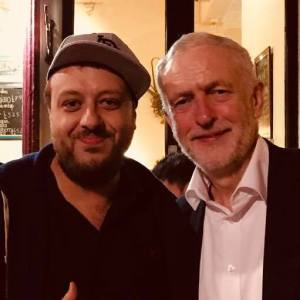
MICHAEL O’SULLIVAN
Michael O’Sullivan is someone whose IT skills and unbelievable work rate have made him a real asset to the Labour Party.
He says his political inspiration came when he was 15, in the kitchen of his friend’s grandfather, Tony Benn. At the time he was in a band with Tony’s grandson!
Tony Benn gave Michael a historical perspective on politics and said that each generation would have to refight the same battles for social justice.
Michael ran a small campaign at university against the Iraq War but didn’t join the Labour Party until 2010 when was angered by the Coalition government.
Michael’s exceptional IT skills became a huge bonus for his local party in Hammersmith, when he became a big part in their digital campaign in the 2014 local elections.
In that campaign, Michael also stood as a council candidate and missed out in becoming a councillor by a tiny margin. However, with Michael’s support on the digital side, Labour in Hammersmith & Fulham overturned a massive Conservative majority.
Michael’s enthusiasm for campaigning blossomed after this and he has since worked successfully on several campaigns, including running the popular Labour Future digital campaign.
Last month he was given a job working in parliament and this is fantastic news.
While the Labour Party has Michael’s skills and drive we are in a great position to win elections and push forward for the social justice.
